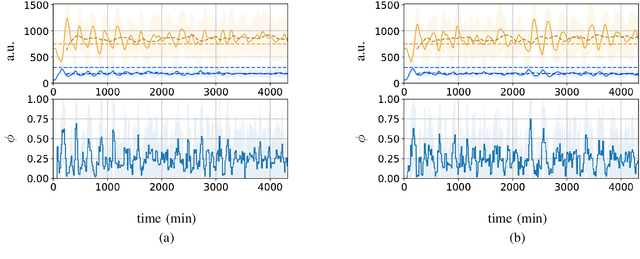Sara Maria Brancato
In vivo learning-based control of microbial populations density in bioreactors
Dec 15, 2023



Abstract:A key problem toward the use of microorganisms as bio-factories is reaching and maintaining cellular communities at a desired density and composition so that they can efficiently convert their biomass into useful compounds. Promising technological platforms for the real time, scalable control of cellular density are bioreactors. In this work, we developed a learning-based strategy to expand the toolbox of available control algorithms capable of regulating the density of a \textit{single} bacterial population in bioreactors. Specifically, we used a sim-to-real paradigm, where a simple mathematical model, calibrated using a few data, was adopted to generate synthetic data for the training of the controller. The resulting policy was then exhaustively tested in vivo using a low-cost bioreactor known as Chi.Bio, assessing performance and robustness. In addition, we compared the performance with more traditional controllers (namely, a PI and an MPC), confirming that the learning-based controller exhibits similar performance in vivo. Our work showcases the viability of learning-based strategies for the control of cellular density in bioreactors, making a step forward toward their use for the control of the composition of microbial consortia.
External control of a genetic toggle switch via Reinforcement Learning
Apr 11, 2022



Abstract:We investigate the problem of using a learning-based strategy to stabilize a synthetic toggle switch via an external control approach. To overcome the data efficiency problem that would render the algorithm unfeasible for practical use in synthetic biology, we adopt a sim-to-real paradigm where the policy is learnt via training on a simplified model of the toggle switch and it is then subsequently exploited to control a more realistic model of the switch parameterized from in-vivo experiments. Our in-silico experiments confirm the viability of the approach suggesting its potential use for in-vivo control implementations.
 Add to Chrome
Add to Chrome Add to Firefox
Add to Firefox Add to Edge
Add to Edge